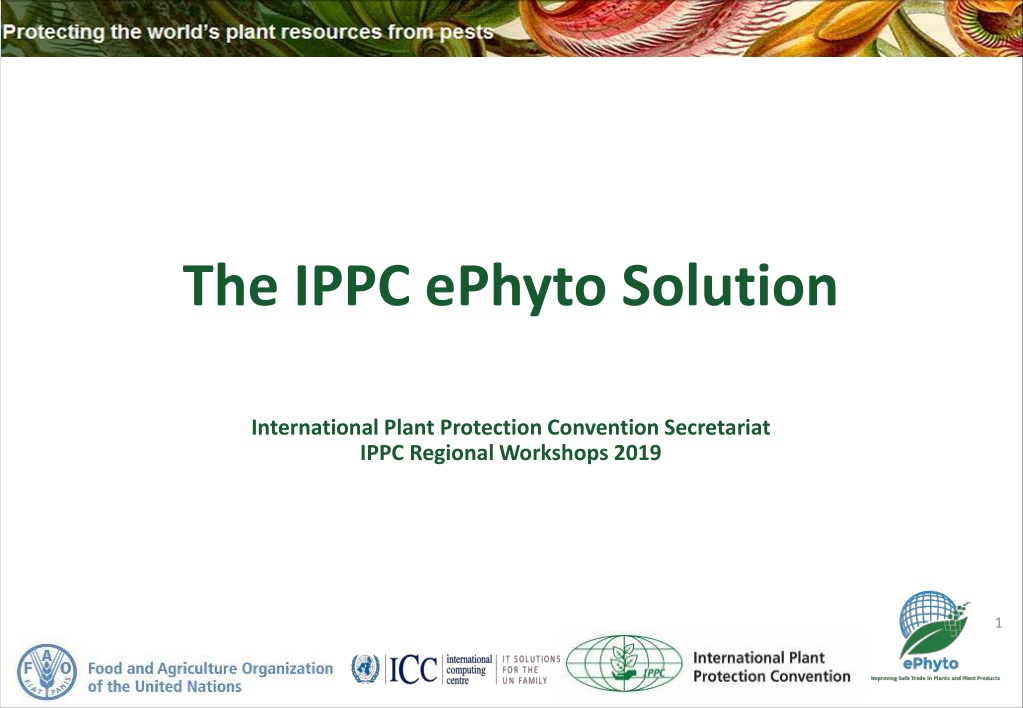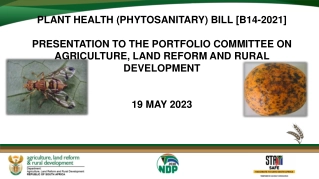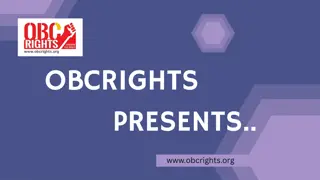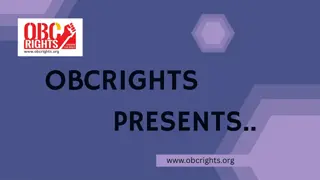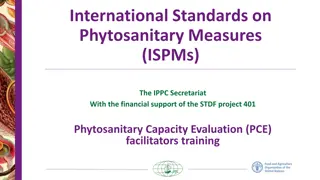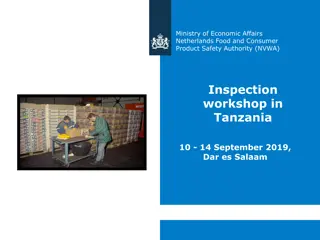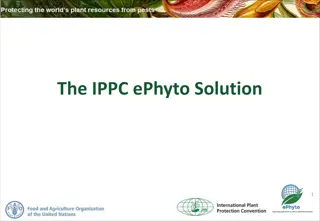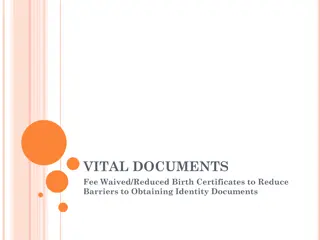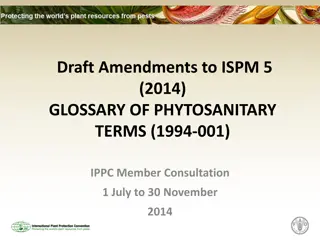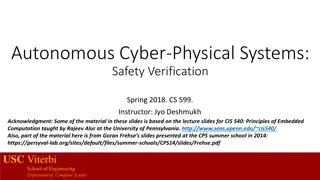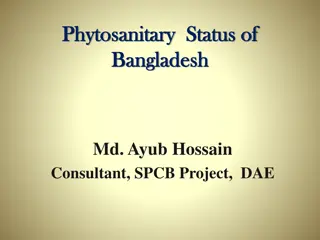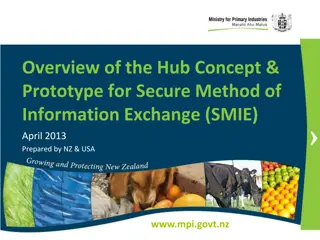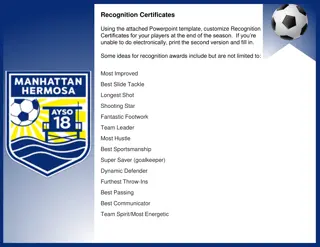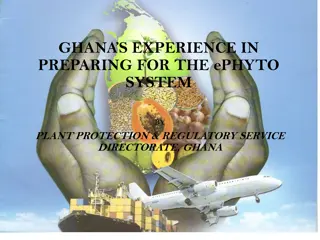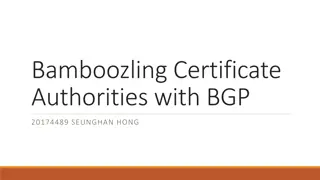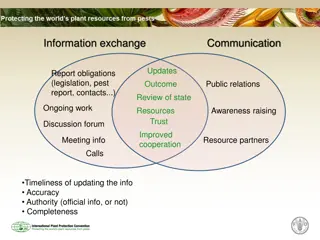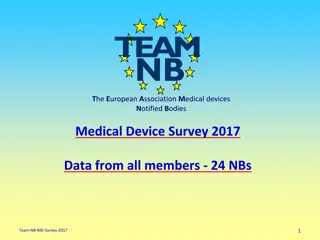Understanding ePhyto: The Future of Electronic Phytosanitary Certificates
The IPPC ePhyto Solution Project facilitates electronic exchange of phytosanitary certificates, offering a harmonized set of rules for safe trade. ePhyto is the electronic alternative to paper certificates, ensuring secure issuance and approval by NPPO officers. This innovative system enhances global trade efficiency, serving as a reliable method without replacing traditional processes. Explore the benefits, standards, and security measures of ePhyto in this detailed overview.
Download Presentation

Please find below an Image/Link to download the presentation.
The content on the website is provided AS IS for your information and personal use only. It may not be sold, licensed, or shared on other websites without obtaining consent from the author. Download presentation by click this link. If you encounter any issues during the download, it is possible that the publisher has removed the file from their server.
E N D
Presentation Transcript
The IPPC ePhyto Solution International Plant Protection Convention Secretariat IPPC Regional Workshops 2019 1
ePhyto in 3 Minutes https://www.youtube.com/watch?time_continue=2&v=gjDz7aOv-Ys
The IPPC ePhyto Solution Project -in brief- Project to facilitate the electronic exchange of phytosanitary certificates All participants use a single harmonized set of rules The only project of its kind among the three World Trade Organization SPS sisters (IPPC (plants), Codex (food safety), OIE (animals)) Allows developing and developed countries to participate regardless of infrastructure capacity Simplified setup and participation Built for less than US$1 million using industry standard solutions Simply another way to exchange phytosanitary certificates and re-export certificates; ePhyto is not mandatory and is not intended to replace the paper process, but instead provide another option to enhance and facilitate safe trade
What is an ePhyto? ePhyto is short for electronic phytosanitary certificate . ePhyto is the electronic equivalent of a paper phytosanitary certificate (ISPM 12) ePhyto is not a PDF or a fax NOT a scan of a paper certificate NOT a paper certificate
What is an ePhyto? Standardized XML schema part of an ePhyto Paper representation
What is an ePhyto? Is it secure? The NPPO officer is the only one that can issue and approve an e- Phyto Each role is assigned by the NPPO officer and they are restricted to what they can do in the system The IPPC Secretariat can verify what countries have access granted to the system The Hub cannot see what the content of the certificate is nor can it store any data The information may be stored in the GeNs but is exclusively available to the specific country to which it belongs
Why ePhyto? Example- Non-compliant documents trigger a higher number of import rejections than actual plant health issues (harmful organisms):
As well as. Inefficient processes in place - labor intensive and highly manual with physical paperwork being couriered around and often re-entered Fraudulent certificates a continuing problem government to government electronic exchange will significantly lower the risk of counterfeiting certificates Millions of emails sent in the grains industry alone more than 275 million emails are sent annually to process the estimated 11,000 shipments of grain transported on the ocean worldwide Any re-issuing of paper phytosanitary certificates has a tremendous cost for business Time and money Deterioration of commodities waiting for clearance Customer claims for late deliveries or bad quality Mountains of paper, a lot of it expensive paper, are produced, printed and stored or destroyed on an annual basis Most Important Access to a dependable, timely and affordable food supply where and when it is needed
Hub and GeNS Countries with National Systems Countries using the GeNS UNICC Rep. of Korea Ghana United States Hub GeNS Sri Lanka Samoa Argentina
Benefits of the Hub Everyone using a single harmonized set of rules Captures the benefits of harmonization and maintains them over the long term Avoids the costs associated with establishing country by country agreements Creates uniform conditions for trade Allows developing and developed countries to participate regardless of infrastructure capacity Facilitates inclusion of national systems developed by countries Simplified setup and participation
Benefits of the GeNS Defined exchange mechanism and a standardized UN/CEFACT schema Issuance/authorization of an ePhyto Sending of an ePhyto Printing of the sent certificate data on paper Receipt of ePhyto Ability to check the authenticity of an ePhyto after receipt Extraction of the data from an ePhyto Printing of the received certificate data on paper Ability to store ePhytos for later reference Connected to the Hub to facilitate certificate transfer Reporting
Harmonization of data Hub and the GeNS follow a harmonized set of rules Availability of a validation tool for the XML Codes and list are based on the Appendix 1 of ISPM 12 Phytosanitary Certificates for countries to access the IPPC ePhyto Solution Harmonization work will be ongoing and is very important for future automation
Harmonization of data Examples - International Standards Organization List of Alpha 2 codes EPPO global database for pest scientific information available in the GeNs Search by common name (in different languages) or by botanical name Product description, types, intended use, package codes, modes of transport, trade and transport locations, unit of measure and status codes
Looking Ahead Full release of the GeNS by 15 July Interface and exchanges with other systems in progress Working towards towards integration with Customs single windows systems Traces system in Europe Application modernization (offline, Mobile app .) Working towards integration with Customs single windows systems Continued methods for streamlining the system
Steps to get involved Hub GeNs Step 1: Get prepared It is mandatory to have the capacity to produce ePhytos must have a system capable of producing certificates read all relevant documents Technical Information the NPPO representative intending to register for the Hub should contact their Official Contact Point Step 2: Registration the NPPO representative can register to the Hub by going to https://www.ephytoexchange.org/AdminConsole/ and clicking Register NPPO The Official IPPC Contact Point validates the registration Step 3: Onboarding the NPPO representative will then receive all relevant onboarding documents needed to implement the Hub Step 1: Get prepared Consider the following factors as they will shape the strategy for implementing ePhyto; Function, Governance, Operational and Legal models, stakeholder consultation and lastly change management Step 2: Registration the NPPO representative should send a message to the IPPC Secretariat at ippc@fao.org The IPPC Secretariat will provide the necessary setup document which must be completed in order to create that countries version of the GeNS Step 3: Onboarding Once the NPPO representative fills in all relevant onboarding documents needed to implement the GeNs, the UNICC will set up a test instance for the country and they can begin testing
Learn more about ePhyto: Learn more about ePhyto: To read more about ePhyto and how to register for the system review the following links: https://www.ippc.int/en/ephyto/ https://www.ephytoexchange.org/landing/ Make sure to follow us on LinkedIn and Twitter to keep updated on all ePhyto news and progress Click on the icons below to take you directly to these platforms
Contact us IPPC Secretariat Food and Agriculture Organization of the United Nations (FAO) Tel.: +39 06 57054812 Email: ippc@fao.org Web: www.ippc.int www.fao.org/plant-health-2020 Risultati immagini per twitter Risultati immagini per facebook button Risultati immagini per linkedin button
